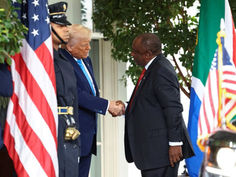The BRICS Alliance: A New Power Bloc in Global Politics?
- Rahmani Khoshnaw

- May 5, 2025
- 4 min read
Khoshnaw Rahmani, JadeTimes Staff
K. Rahmani is a Jadetimes news reporter covering Politics.

In recent years, the world of international relations has witnessed a dramatic shift. Gone are the days when global power was confined to a handful of traditional players. Today, a dynamic coalition known as BRICS—comprising Brazil, Russia, India, China, and South Africa—is rapidly reshaping the geopolitical landscape. This alliance is not merely another grouping of nations; it represents a bold challenge to conventional global order, signaling a move toward a more multipolar world where power is shared broadly.
As established powers grapple with new realities, BRICS has quietly emerged as a force to be reckoned with. By championing multilateralism and advocating reforms in global governance, this alliance is writing a new chapter in international politics. In this article, we explore how BRICS evolved from a group of emerging economies into a formidable power bloc, examine its impact on global affairs with hard-hitting statistics, and discuss what its growing influence could mean for the future of international relations.
Historical Context and Evolution
The term “BRIC” was coined in the early 2000s as emerging economies in Brazil, Russia, India, and China began to assert their potential on the international stage. With the inclusion of South Africa in 2010 and more recently, the addition of six new members in 2024—Saudi Arabia, UAE, Egypt, Ethiopia, Indonesia, and Iran—the bloc’s composition has expanded dramatically. According to data from the official BRICS website, these changes propelled BRICS’ share of the global GDP (in PPP terms) to approximately 39% as of 2023. This impressive figure reflects the combined economic heft of its members, which now influences international economic policymaking and challenges longstanding power centers.
Over the past two decades, several factors have driven the evolution of BRICS:
• Economic Transformation: Rapid industrialization and rising consumer markets have allowed BRICS nations to rival traditional economic powerhouses. For instance, BRICS now directly account for 24% of total global trade, underscoring their growing role in international commerce.
• Political Aspirations: Beyond economic might, these nations have consistently argued that global governance should more accurately reflect 21st-century realities. Their collective push for overhauling institutions like the International Monetary Fund (IMF) and the World Bank is grounded in the view that emerging economies deserve a fairer share of international influence.
• Strategic Convergence: Despite their diverse political systems and cultural backgrounds, BRICS countries share a common vision of a multipolar world where decision-making isn’t dominated by a select few. This convergence is central to their collective efforts on the global stage.
Geopolitical and Economic Impact
BRICS is making its mark in several key areas:
• Reshaping Global Governance: One of the bloc’s most critical contributions is its demand for institutional reform. BRICS members have repeatedly called for more inclusive decision-making processes in global institutions. Their advocacy for fairer representation in the United Nations and the IMF challenges decades-old power structures dominated by Western nations.
• Economic Influence: The combined economic clout of BRICS is undeniable. Data from the BRICS Data portal shows that after the expansion in 2024, the bloc’s economic influence surged. For example, Brazil’s trade with BRICS nations amounted to a staggering USD 210 billion in 2024—representing 35% of its total trade. Similarly, BRICS accounted for roughly 36% of Brazil’s exports (valued at USD 121 billion) and about 34% of its imports (USD 88 billion). Collectively, these figures reveal a robust trading network that not only underpins the economies of these nations but also provides an alternative channel to the Western-dominated financial systems.
• Diplomatic Weight: On the international stage, BRICS has transformed into a vital platform for dialogue among diverse nations. Their annual summits and coordinated policy statements—addressing issues from climate change to global security—underscore the group’s ability to influence multilateral discussions. With a unified voice, BRICS helps galvanize support for reforms that could reshape global governance.
Challenges and Future Prospects
Despite its impressive ascent, the BRICS alliance faces several hurdles:
• Internal Differences: The same diversity that strengthens BRICS can also sow discord. With distinct political systems, economic priorities, and cultural contexts across its member states, reaching consensus is often challenging. These internal tensions could potentially undercut the bloc’s broader ambitions.
• External Pressures: As BRICS gains influence, established power blocs and traditional alliances remain wary. The rise of BRICS has not come without resistance: established powers often push back against reforms that might dilute their influence. This friction complicates efforts to implement substantial changes in global institutions.
• Implementation of Reforms: While the rhetoric around global governance reform is powerful, translating these ideas into tangible changes is a slow and arduous process. Even with monumental numbers—such as a 39% global GDP share and 24% of international trade—the practical impact depends on whether these nations can coordinate effective action amidst pressing domestic concerns.
Looking ahead, the future of BRICS remains both promising and uncertain. If the bloc can surmount internal divisions and overcome external pressures, it might pioneer a more equitable global order. Conversely, persistent differences and geopolitical pushback could restrict its transformative potential, confining it to a platform for dialogue rather than full-scale global governance reform.
As the world pivots toward a more balanced order, the rise of BRICS forces us to reconsider what power really means. This isn’t merely about impressive statistics—though figures like 39% of global GDP and 24% of international trade speak volumes—it’s about a fundamental shift in whose voices are heard on the global stage. BRICS challenges us to ask: In a world teetering between established power and emerging force, can a diverse alliance truly reshape international norms?
Witnessing these nations navigate both internal differences and external pressures, one can’t help but imagine a future where global governance is reimagined not as a playground for a few, but a stage for many. The narrative of BRICS is still unfolding, filled with bold declarations, robust economic data, and hard-headed negotiations. The question remains: Could this alliance—despite its challenges—herald a new era of global unity and justice? Only time will tell, but one thing is clear: the evolving dynamics of BRICS are urging us to rethink not only global power but the very future of international order.











































Comments